Legal Aspects of International Business and Enterprise Report Analysis
VerifiedAdded on 2023/06/07
|11
|2644
|91
Report
AI Summary
This report examines the legal aspects of international business, specifically focusing on Nippon Telegraph and Telephone (NTT) in Australia. It begins with a brief overview of the company, including its industry, staff numbers, and global headquarters location. The report then delves into the legislative and regulatory reforms affecting NTT, detailing the impact of Australian laws, such as privacy, environmental, consumer, and property laws, and the Telecommunications Act of 1997. It explores the role of the Australian Competition and Consumer Commission (ACCC) and the Australian Communications and Media Authority (ACMA). The report also analyzes the impact of treaties, conventions, and agreements, particularly the Japan-Australia Economic Partnership Agreement (JAEPA), on NTT's products and services, highlighting the benefits of free trade agreements in boosting the telecommunications industry and fostering innovation. The analysis underscores how these agreements facilitate the launch of new services and enhance the overall telecommunication infrastructure, ultimately contributing to economic growth and development.

Legal Aspect of International Business
and Enterprise
and Enterprise
Paraphrase This Document
Need a fresh take? Get an instant paraphrase of this document with our AI Paraphraser
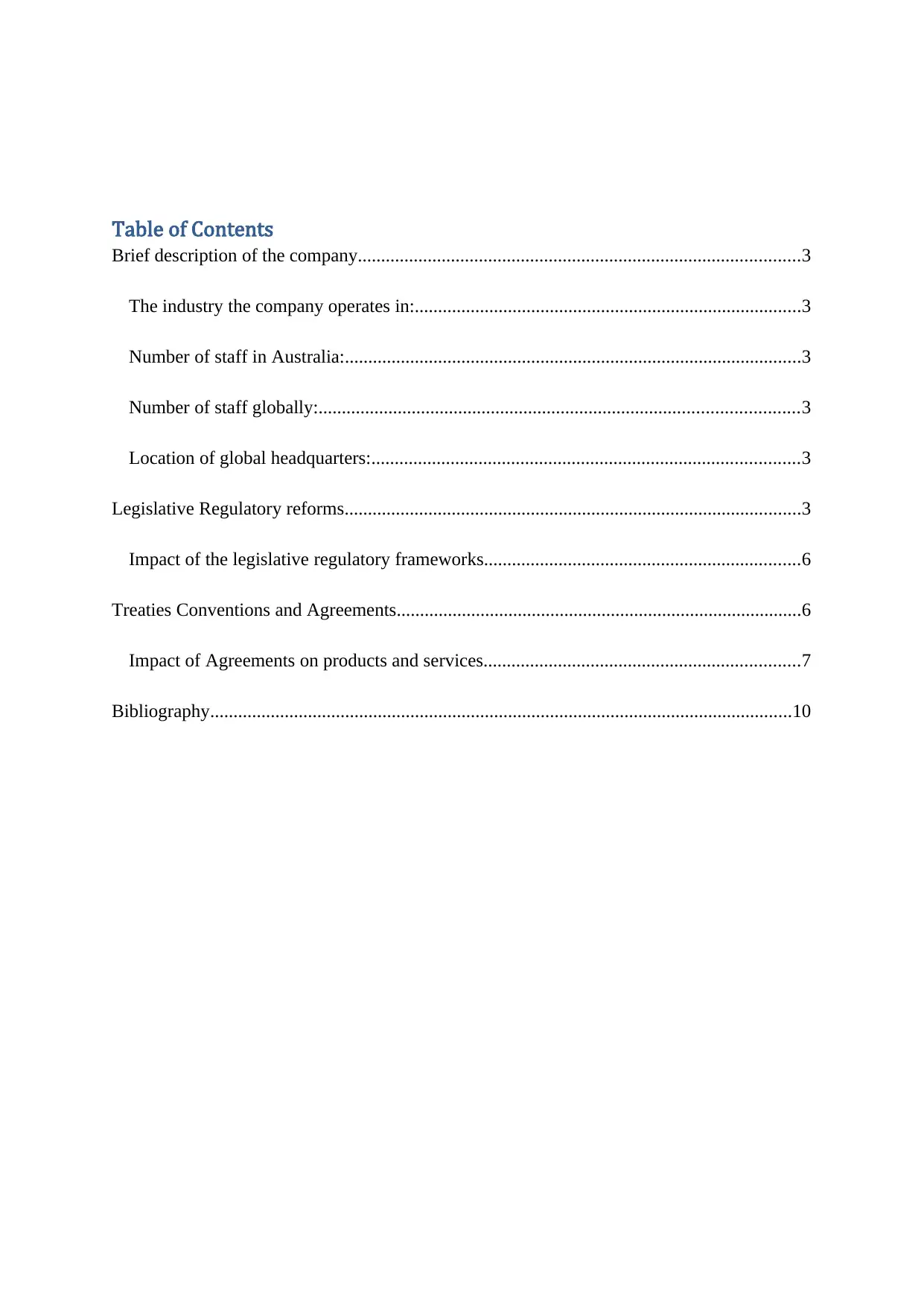
Table of Contents
Brief description of the company...............................................................................................3
The industry the company operates in:...................................................................................3
Number of staff in Australia:..................................................................................................3
Number of staff globally:.......................................................................................................3
Location of global headquarters:............................................................................................3
Legislative Regulatory reforms..................................................................................................3
Impact of the legislative regulatory frameworks....................................................................6
Treaties Conventions and Agreements.......................................................................................6
Impact of Agreements on products and services....................................................................7
Bibliography.............................................................................................................................10
Brief description of the company...............................................................................................3
The industry the company operates in:...................................................................................3
Number of staff in Australia:..................................................................................................3
Number of staff globally:.......................................................................................................3
Location of global headquarters:............................................................................................3
Legislative Regulatory reforms..................................................................................................3
Impact of the legislative regulatory frameworks....................................................................6
Treaties Conventions and Agreements.......................................................................................6
Impact of Agreements on products and services....................................................................7
Bibliography.............................................................................................................................10
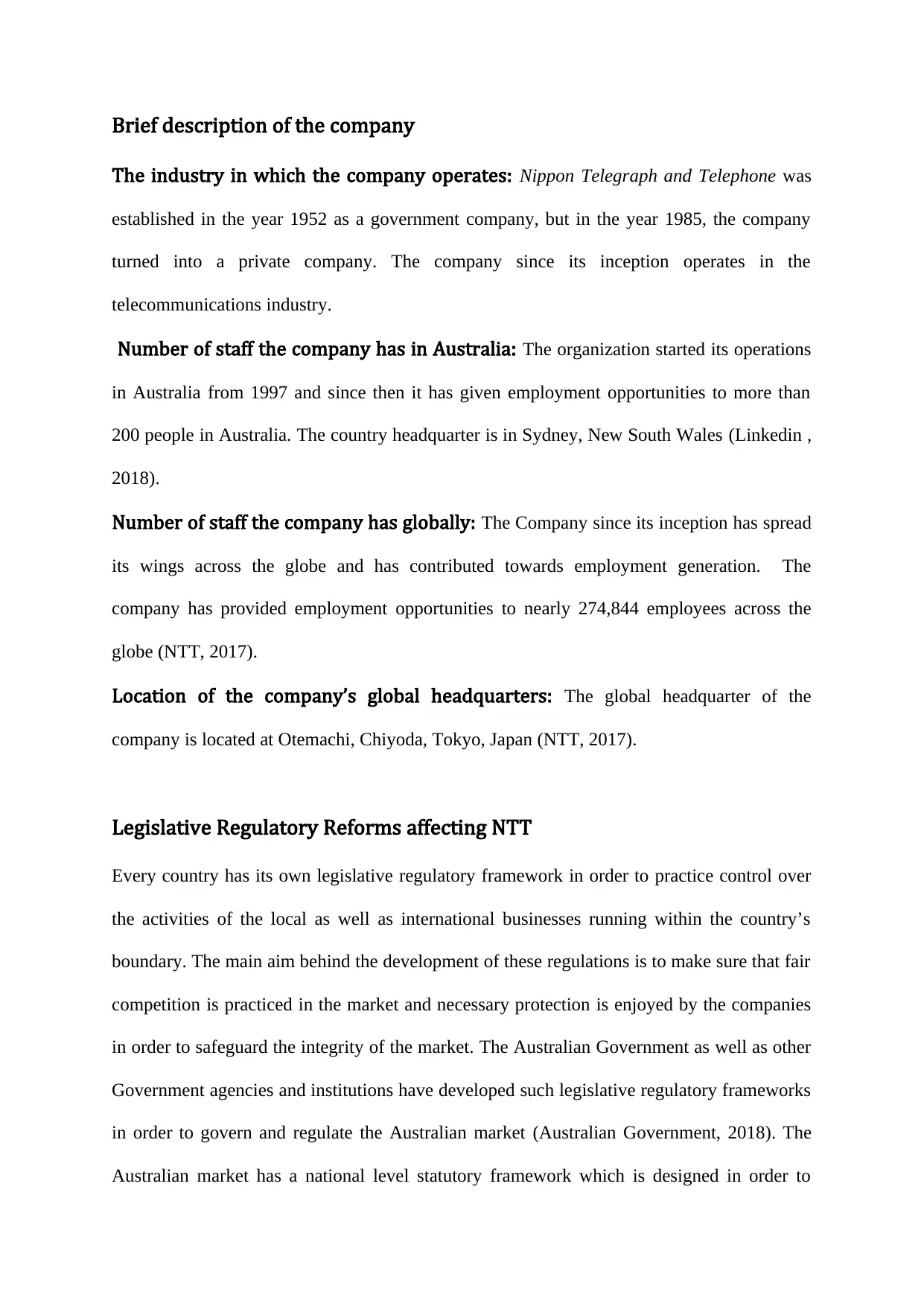
Brief description of the company
The industry in which the company operates: Nippon Telegraph and Telephone was
established in the year 1952 as a government company, but in the year 1985, the company
turned into a private company. The company since its inception operates in the
telecommunications industry.
Number of staff the company has in Australia: The organization started its operations
in Australia from 1997 and since then it has given employment opportunities to more than
200 people in Australia. The country headquarter is in Sydney, New South Wales (Linkedin ,
2018).
Number of staff the company has globally: The Company since its inception has spread
its wings across the globe and has contributed towards employment generation. The
company has provided employment opportunities to nearly 274,844 employees across the
globe (NTT, 2017).
Location of the company’s global headquarters: The global headquarter of the
company is located at Otemachi, Chiyoda, Tokyo, Japan (NTT, 2017).
Legislative Regulatory Reforms affecting NTT
Every country has its own legislative regulatory framework in order to practice control over
the activities of the local as well as international businesses running within the country’s
boundary. The main aim behind the development of these regulations is to make sure that fair
competition is practiced in the market and necessary protection is enjoyed by the companies
in order to safeguard the integrity of the market. The Australian Government as well as other
Government agencies and institutions have developed such legislative regulatory frameworks
in order to govern and regulate the Australian market (Australian Government, 2018). The
Australian market has a national level statutory framework which is designed in order to
The industry in which the company operates: Nippon Telegraph and Telephone was
established in the year 1952 as a government company, but in the year 1985, the company
turned into a private company. The company since its inception operates in the
telecommunications industry.
Number of staff the company has in Australia: The organization started its operations
in Australia from 1997 and since then it has given employment opportunities to more than
200 people in Australia. The country headquarter is in Sydney, New South Wales (Linkedin ,
2018).
Number of staff the company has globally: The Company since its inception has spread
its wings across the globe and has contributed towards employment generation. The
company has provided employment opportunities to nearly 274,844 employees across the
globe (NTT, 2017).
Location of the company’s global headquarters: The global headquarter of the
company is located at Otemachi, Chiyoda, Tokyo, Japan (NTT, 2017).
Legislative Regulatory Reforms affecting NTT
Every country has its own legislative regulatory framework in order to practice control over
the activities of the local as well as international businesses running within the country’s
boundary. The main aim behind the development of these regulations is to make sure that fair
competition is practiced in the market and necessary protection is enjoyed by the companies
in order to safeguard the integrity of the market. The Australian Government as well as other
Government agencies and institutions have developed such legislative regulatory frameworks
in order to govern and regulate the Australian market (Australian Government, 2018). The
Australian market has a national level statutory framework which is designed in order to
⊘ This is a preview!⊘
Do you want full access?
Subscribe today to unlock all pages.

Trusted by 1+ million students worldwide
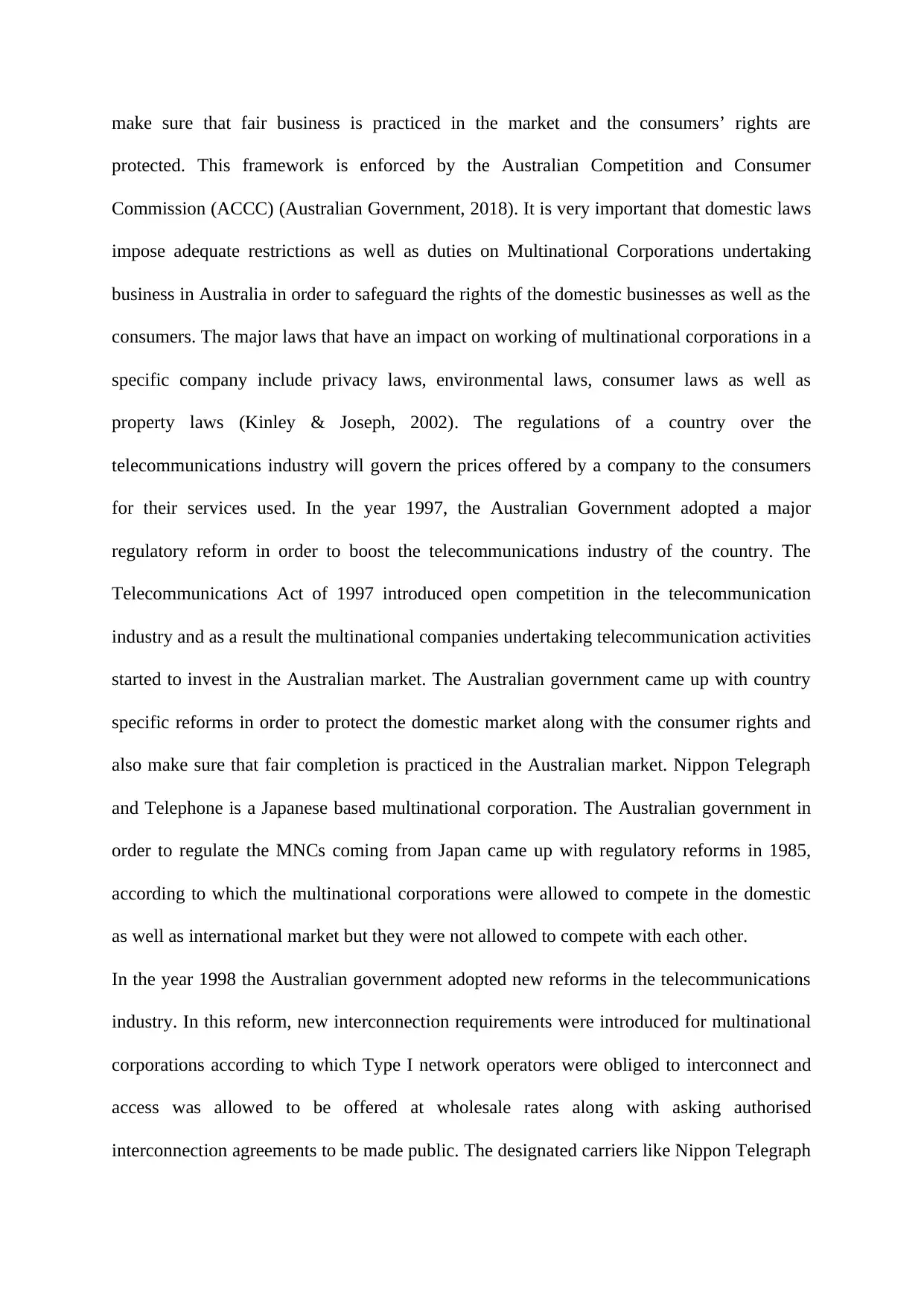
make sure that fair business is practiced in the market and the consumers’ rights are
protected. This framework is enforced by the Australian Competition and Consumer
Commission (ACCC) (Australian Government, 2018). It is very important that domestic laws
impose adequate restrictions as well as duties on Multinational Corporations undertaking
business in Australia in order to safeguard the rights of the domestic businesses as well as the
consumers. The major laws that have an impact on working of multinational corporations in a
specific company include privacy laws, environmental laws, consumer laws as well as
property laws (Kinley & Joseph, 2002). The regulations of a country over the
telecommunications industry will govern the prices offered by a company to the consumers
for their services used. In the year 1997, the Australian Government adopted a major
regulatory reform in order to boost the telecommunications industry of the country. The
Telecommunications Act of 1997 introduced open competition in the telecommunication
industry and as a result the multinational companies undertaking telecommunication activities
started to invest in the Australian market. The Australian government came up with country
specific reforms in order to protect the domestic market along with the consumer rights and
also make sure that fair completion is practiced in the Australian market. Nippon Telegraph
and Telephone is a Japanese based multinational corporation. The Australian government in
order to regulate the MNCs coming from Japan came up with regulatory reforms in 1985,
according to which the multinational corporations were allowed to compete in the domestic
as well as international market but they were not allowed to compete with each other.
In the year 1998 the Australian government adopted new reforms in the telecommunications
industry. In this reform, new interconnection requirements were introduced for multinational
corporations according to which Type I network operators were obliged to interconnect and
access was allowed to be offered at wholesale rates along with asking authorised
interconnection agreements to be made public. The designated carriers like Nippon Telegraph
protected. This framework is enforced by the Australian Competition and Consumer
Commission (ACCC) (Australian Government, 2018). It is very important that domestic laws
impose adequate restrictions as well as duties on Multinational Corporations undertaking
business in Australia in order to safeguard the rights of the domestic businesses as well as the
consumers. The major laws that have an impact on working of multinational corporations in a
specific company include privacy laws, environmental laws, consumer laws as well as
property laws (Kinley & Joseph, 2002). The regulations of a country over the
telecommunications industry will govern the prices offered by a company to the consumers
for their services used. In the year 1997, the Australian Government adopted a major
regulatory reform in order to boost the telecommunications industry of the country. The
Telecommunications Act of 1997 introduced open competition in the telecommunication
industry and as a result the multinational companies undertaking telecommunication activities
started to invest in the Australian market. The Australian government came up with country
specific reforms in order to protect the domestic market along with the consumer rights and
also make sure that fair completion is practiced in the Australian market. Nippon Telegraph
and Telephone is a Japanese based multinational corporation. The Australian government in
order to regulate the MNCs coming from Japan came up with regulatory reforms in 1985,
according to which the multinational corporations were allowed to compete in the domestic
as well as international market but they were not allowed to compete with each other.
In the year 1998 the Australian government adopted new reforms in the telecommunications
industry. In this reform, new interconnection requirements were introduced for multinational
corporations according to which Type I network operators were obliged to interconnect and
access was allowed to be offered at wholesale rates along with asking authorised
interconnection agreements to be made public. The designated carriers like Nippon Telegraph
Paraphrase This Document
Need a fresh take? Get an instant paraphrase of this document with our AI Paraphraser
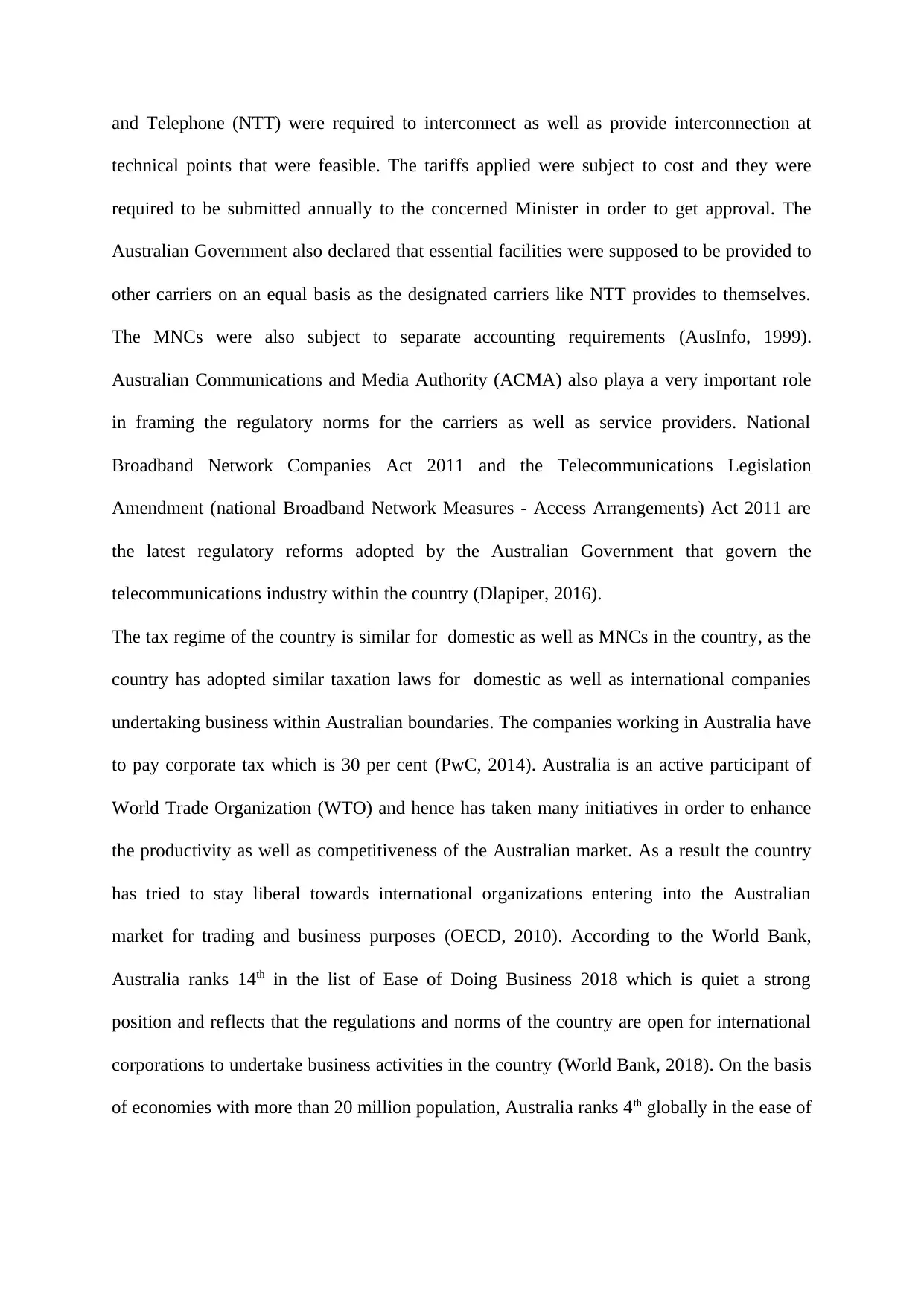
and Telephone (NTT) were required to interconnect as well as provide interconnection at
technical points that were feasible. The tariffs applied were subject to cost and they were
required to be submitted annually to the concerned Minister in order to get approval. The
Australian Government also declared that essential facilities were supposed to be provided to
other carriers on an equal basis as the designated carriers like NTT provides to themselves.
The MNCs were also subject to separate accounting requirements (AusInfo, 1999).
Australian Communications and Media Authority (ACMA) also playa a very important role
in framing the regulatory norms for the carriers as well as service providers. National
Broadband Network Companies Act 2011 and the Telecommunications Legislation
Amendment (national Broadband Network Measures - Access Arrangements) Act 2011 are
the latest regulatory reforms adopted by the Australian Government that govern the
telecommunications industry within the country (Dlapiper, 2016).
The tax regime of the country is similar for domestic as well as MNCs in the country, as the
country has adopted similar taxation laws for domestic as well as international companies
undertaking business within Australian boundaries. The companies working in Australia have
to pay corporate tax which is 30 per cent (PwC, 2014). Australia is an active participant of
World Trade Organization (WTO) and hence has taken many initiatives in order to enhance
the productivity as well as competitiveness of the Australian market. As a result the country
has tried to stay liberal towards international organizations entering into the Australian
market for trading and business purposes (OECD, 2010). According to the World Bank,
Australia ranks 14th in the list of Ease of Doing Business 2018 which is quiet a strong
position and reflects that the regulations and norms of the country are open for international
corporations to undertake business activities in the country (World Bank, 2018). On the basis
of economies with more than 20 million population, Australia ranks 4th globally in the ease of
technical points that were feasible. The tariffs applied were subject to cost and they were
required to be submitted annually to the concerned Minister in order to get approval. The
Australian Government also declared that essential facilities were supposed to be provided to
other carriers on an equal basis as the designated carriers like NTT provides to themselves.
The MNCs were also subject to separate accounting requirements (AusInfo, 1999).
Australian Communications and Media Authority (ACMA) also playa a very important role
in framing the regulatory norms for the carriers as well as service providers. National
Broadband Network Companies Act 2011 and the Telecommunications Legislation
Amendment (national Broadband Network Measures - Access Arrangements) Act 2011 are
the latest regulatory reforms adopted by the Australian Government that govern the
telecommunications industry within the country (Dlapiper, 2016).
The tax regime of the country is similar for domestic as well as MNCs in the country, as the
country has adopted similar taxation laws for domestic as well as international companies
undertaking business within Australian boundaries. The companies working in Australia have
to pay corporate tax which is 30 per cent (PwC, 2014). Australia is an active participant of
World Trade Organization (WTO) and hence has taken many initiatives in order to enhance
the productivity as well as competitiveness of the Australian market. As a result the country
has tried to stay liberal towards international organizations entering into the Australian
market for trading and business purposes (OECD, 2010). According to the World Bank,
Australia ranks 14th in the list of Ease of Doing Business 2018 which is quiet a strong
position and reflects that the regulations and norms of the country are open for international
corporations to undertake business activities in the country (World Bank, 2018). On the basis
of economies with more than 20 million population, Australia ranks 4th globally in the ease of
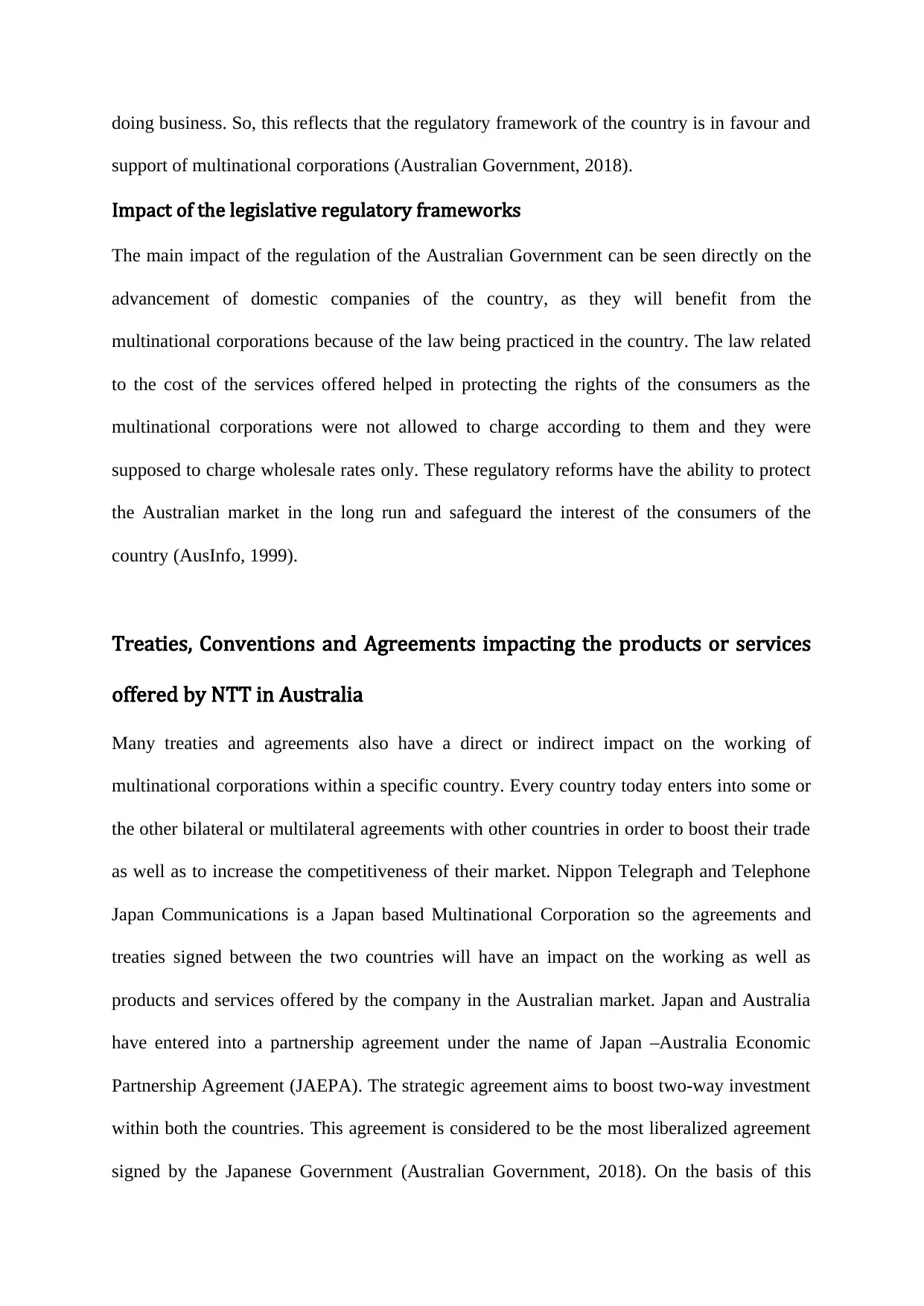
doing business. So, this reflects that the regulatory framework of the country is in favour and
support of multinational corporations (Australian Government, 2018).
Impact of the legislative regulatory frameworks
The main impact of the regulation of the Australian Government can be seen directly on the
advancement of domestic companies of the country, as they will benefit from the
multinational corporations because of the law being practiced in the country. The law related
to the cost of the services offered helped in protecting the rights of the consumers as the
multinational corporations were not allowed to charge according to them and they were
supposed to charge wholesale rates only. These regulatory reforms have the ability to protect
the Australian market in the long run and safeguard the interest of the consumers of the
country (AusInfo, 1999).
Treaties, Conventions and Agreements impacting the products or services
offered by NTT in Australia
Many treaties and agreements also have a direct or indirect impact on the working of
multinational corporations within a specific country. Every country today enters into some or
the other bilateral or multilateral agreements with other countries in order to boost their trade
as well as to increase the competitiveness of their market. Nippon Telegraph and Telephone
Japan Communications is a Japan based Multinational Corporation so the agreements and
treaties signed between the two countries will have an impact on the working as well as
products and services offered by the company in the Australian market. Japan and Australia
have entered into a partnership agreement under the name of Japan –Australia Economic
Partnership Agreement (JAEPA). The strategic agreement aims to boost two-way investment
within both the countries. This agreement is considered to be the most liberalized agreement
signed by the Japanese Government (Australian Government, 2018). On the basis of this
support of multinational corporations (Australian Government, 2018).
Impact of the legislative regulatory frameworks
The main impact of the regulation of the Australian Government can be seen directly on the
advancement of domestic companies of the country, as they will benefit from the
multinational corporations because of the law being practiced in the country. The law related
to the cost of the services offered helped in protecting the rights of the consumers as the
multinational corporations were not allowed to charge according to them and they were
supposed to charge wholesale rates only. These regulatory reforms have the ability to protect
the Australian market in the long run and safeguard the interest of the consumers of the
country (AusInfo, 1999).
Treaties, Conventions and Agreements impacting the products or services
offered by NTT in Australia
Many treaties and agreements also have a direct or indirect impact on the working of
multinational corporations within a specific country. Every country today enters into some or
the other bilateral or multilateral agreements with other countries in order to boost their trade
as well as to increase the competitiveness of their market. Nippon Telegraph and Telephone
Japan Communications is a Japan based Multinational Corporation so the agreements and
treaties signed between the two countries will have an impact on the working as well as
products and services offered by the company in the Australian market. Japan and Australia
have entered into a partnership agreement under the name of Japan –Australia Economic
Partnership Agreement (JAEPA). The strategic agreement aims to boost two-way investment
within both the countries. This agreement is considered to be the most liberalized agreement
signed by the Japanese Government (Australian Government, 2018). On the basis of this
⊘ This is a preview!⊘
Do you want full access?
Subscribe today to unlock all pages.

Trusted by 1+ million students worldwide
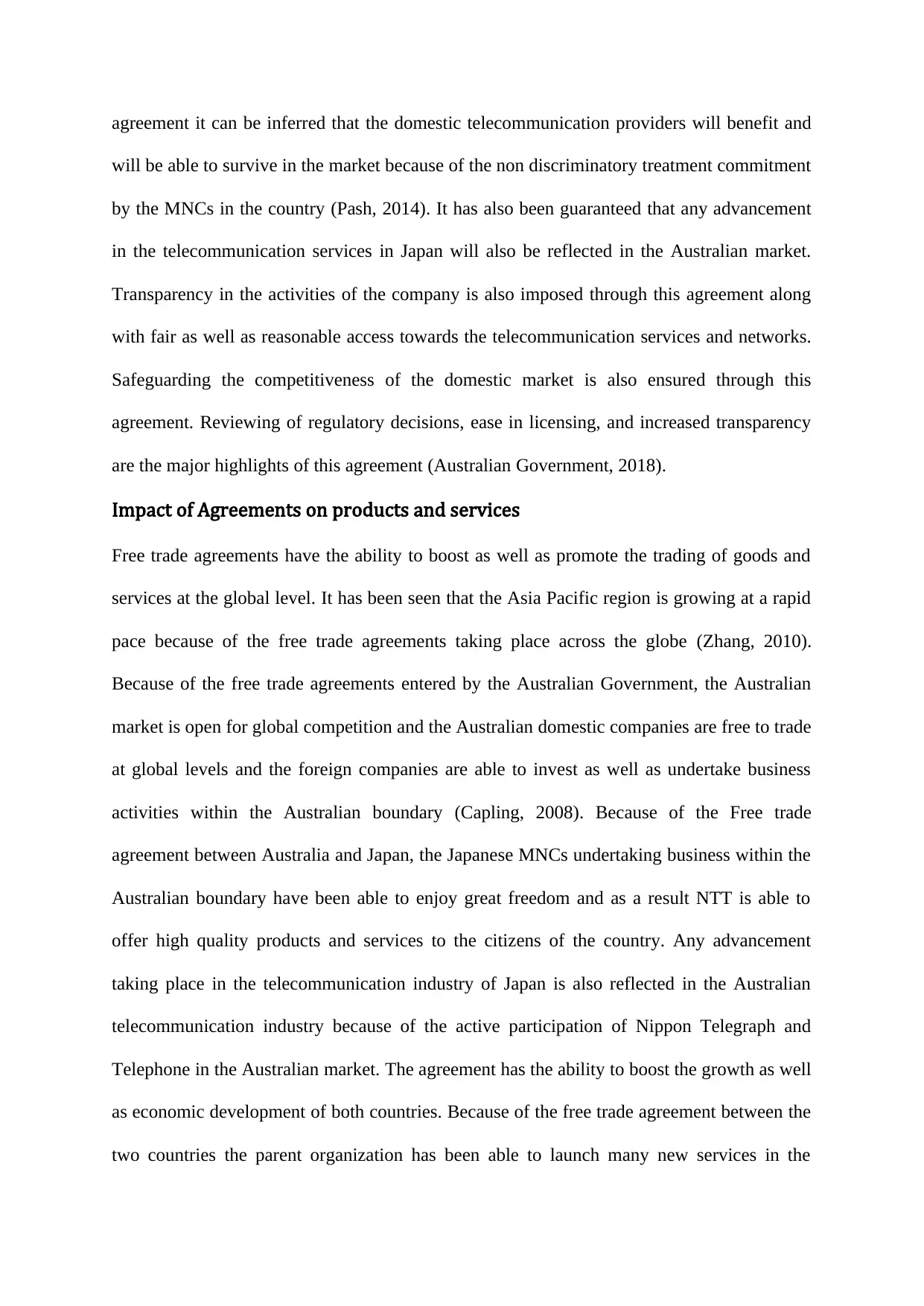
agreement it can be inferred that the domestic telecommunication providers will benefit and
will be able to survive in the market because of the non discriminatory treatment commitment
by the MNCs in the country (Pash, 2014). It has also been guaranteed that any advancement
in the telecommunication services in Japan will also be reflected in the Australian market.
Transparency in the activities of the company is also imposed through this agreement along
with fair as well as reasonable access towards the telecommunication services and networks.
Safeguarding the competitiveness of the domestic market is also ensured through this
agreement. Reviewing of regulatory decisions, ease in licensing, and increased transparency
are the major highlights of this agreement (Australian Government, 2018).
Impact of Agreements on products and services
Free trade agreements have the ability to boost as well as promote the trading of goods and
services at the global level. It has been seen that the Asia Pacific region is growing at a rapid
pace because of the free trade agreements taking place across the globe (Zhang, 2010).
Because of the free trade agreements entered by the Australian Government, the Australian
market is open for global competition and the Australian domestic companies are free to trade
at global levels and the foreign companies are able to invest as well as undertake business
activities within the Australian boundary (Capling, 2008). Because of the Free trade
agreement between Australia and Japan, the Japanese MNCs undertaking business within the
Australian boundary have been able to enjoy great freedom and as a result NTT is able to
offer high quality products and services to the citizens of the country. Any advancement
taking place in the telecommunication industry of Japan is also reflected in the Australian
telecommunication industry because of the active participation of Nippon Telegraph and
Telephone in the Australian market. The agreement has the ability to boost the growth as well
as economic development of both countries. Because of the free trade agreement between the
two countries the parent organization has been able to launch many new services in the
will be able to survive in the market because of the non discriminatory treatment commitment
by the MNCs in the country (Pash, 2014). It has also been guaranteed that any advancement
in the telecommunication services in Japan will also be reflected in the Australian market.
Transparency in the activities of the company is also imposed through this agreement along
with fair as well as reasonable access towards the telecommunication services and networks.
Safeguarding the competitiveness of the domestic market is also ensured through this
agreement. Reviewing of regulatory decisions, ease in licensing, and increased transparency
are the major highlights of this agreement (Australian Government, 2018).
Impact of Agreements on products and services
Free trade agreements have the ability to boost as well as promote the trading of goods and
services at the global level. It has been seen that the Asia Pacific region is growing at a rapid
pace because of the free trade agreements taking place across the globe (Zhang, 2010).
Because of the free trade agreements entered by the Australian Government, the Australian
market is open for global competition and the Australian domestic companies are free to trade
at global levels and the foreign companies are able to invest as well as undertake business
activities within the Australian boundary (Capling, 2008). Because of the Free trade
agreement between Australia and Japan, the Japanese MNCs undertaking business within the
Australian boundary have been able to enjoy great freedom and as a result NTT is able to
offer high quality products and services to the citizens of the country. Any advancement
taking place in the telecommunication industry of Japan is also reflected in the Australian
telecommunication industry because of the active participation of Nippon Telegraph and
Telephone in the Australian market. The agreement has the ability to boost the growth as well
as economic development of both countries. Because of the free trade agreement between the
two countries the parent organization has been able to launch many new services in the
Paraphrase This Document
Need a fresh take? Get an instant paraphrase of this document with our AI Paraphraser
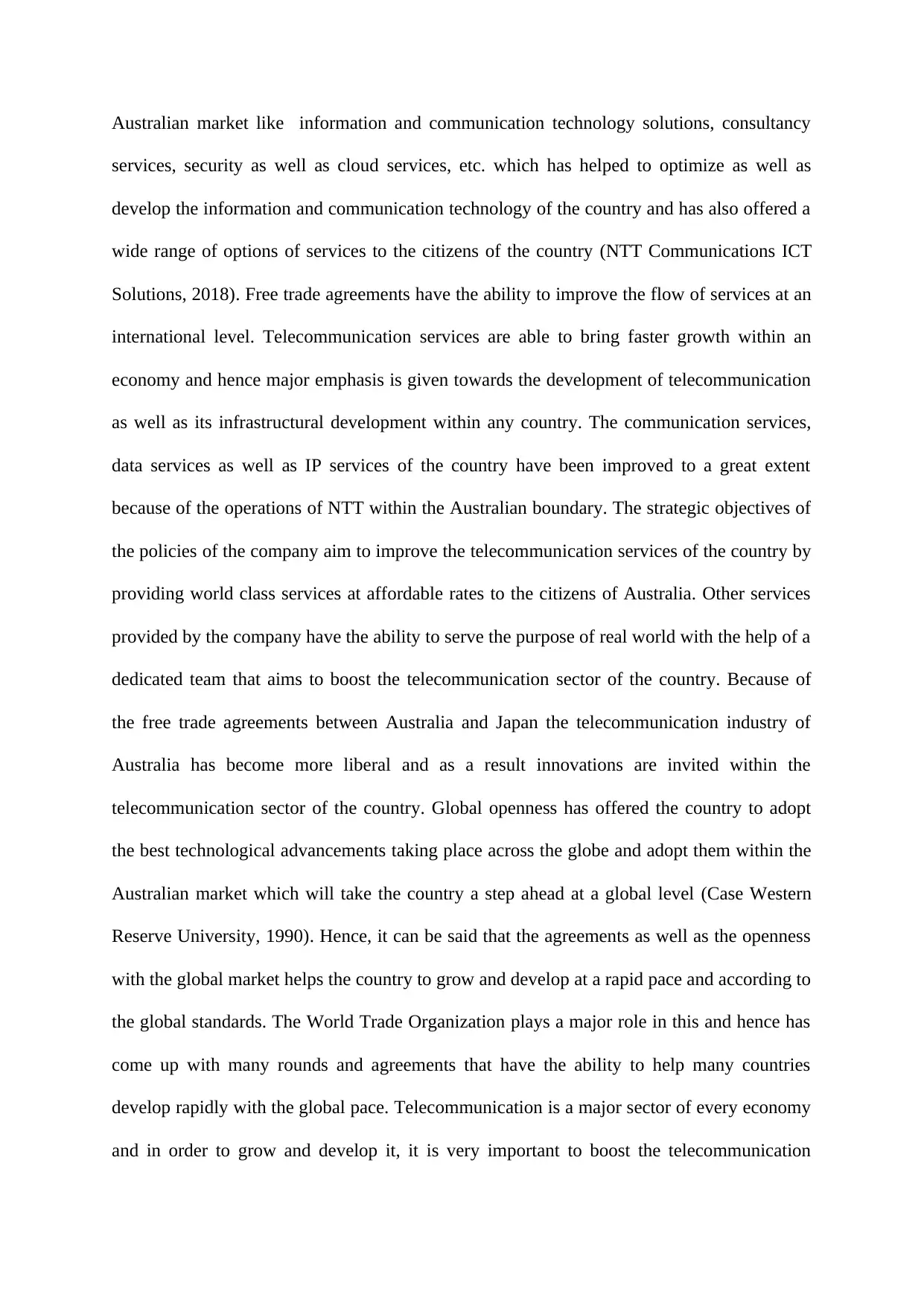
Australian market like information and communication technology solutions, consultancy
services, security as well as cloud services, etc. which has helped to optimize as well as
develop the information and communication technology of the country and has also offered a
wide range of options of services to the citizens of the country (NTT Communications ICT
Solutions, 2018). Free trade agreements have the ability to improve the flow of services at an
international level. Telecommunication services are able to bring faster growth within an
economy and hence major emphasis is given towards the development of telecommunication
as well as its infrastructural development within any country. The communication services,
data services as well as IP services of the country have been improved to a great extent
because of the operations of NTT within the Australian boundary. The strategic objectives of
the policies of the company aim to improve the telecommunication services of the country by
providing world class services at affordable rates to the citizens of Australia. Other services
provided by the company have the ability to serve the purpose of real world with the help of a
dedicated team that aims to boost the telecommunication sector of the country. Because of
the free trade agreements between Australia and Japan the telecommunication industry of
Australia has become more liberal and as a result innovations are invited within the
telecommunication sector of the country. Global openness has offered the country to adopt
the best technological advancements taking place across the globe and adopt them within the
Australian market which will take the country a step ahead at a global level (Case Western
Reserve University, 1990). Hence, it can be said that the agreements as well as the openness
with the global market helps the country to grow and develop at a rapid pace and according to
the global standards. The World Trade Organization plays a major role in this and hence has
come up with many rounds and agreements that have the ability to help many countries
develop rapidly with the global pace. Telecommunication is a major sector of every economy
and in order to grow and develop it, it is very important to boost the telecommunication
services, security as well as cloud services, etc. which has helped to optimize as well as
develop the information and communication technology of the country and has also offered a
wide range of options of services to the citizens of the country (NTT Communications ICT
Solutions, 2018). Free trade agreements have the ability to improve the flow of services at an
international level. Telecommunication services are able to bring faster growth within an
economy and hence major emphasis is given towards the development of telecommunication
as well as its infrastructural development within any country. The communication services,
data services as well as IP services of the country have been improved to a great extent
because of the operations of NTT within the Australian boundary. The strategic objectives of
the policies of the company aim to improve the telecommunication services of the country by
providing world class services at affordable rates to the citizens of Australia. Other services
provided by the company have the ability to serve the purpose of real world with the help of a
dedicated team that aims to boost the telecommunication sector of the country. Because of
the free trade agreements between Australia and Japan the telecommunication industry of
Australia has become more liberal and as a result innovations are invited within the
telecommunication sector of the country. Global openness has offered the country to adopt
the best technological advancements taking place across the globe and adopt them within the
Australian market which will take the country a step ahead at a global level (Case Western
Reserve University, 1990). Hence, it can be said that the agreements as well as the openness
with the global market helps the country to grow and develop at a rapid pace and according to
the global standards. The World Trade Organization plays a major role in this and hence has
come up with many rounds and agreements that have the ability to help many countries
develop rapidly with the global pace. Telecommunication is a major sector of every economy
and in order to grow and develop it, it is very important to boost the telecommunication
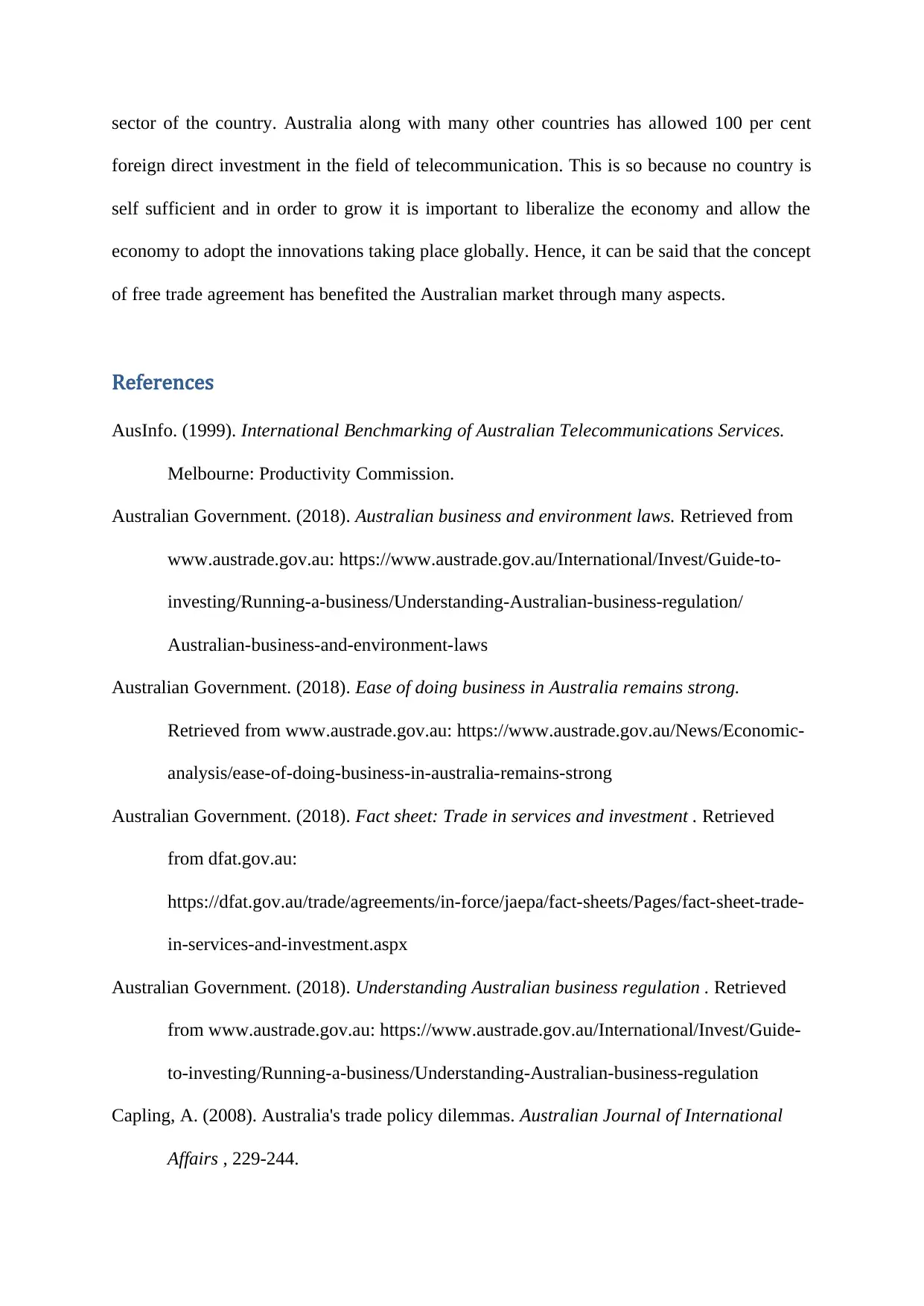
sector of the country. Australia along with many other countries has allowed 100 per cent
foreign direct investment in the field of telecommunication. This is so because no country is
self sufficient and in order to grow it is important to liberalize the economy and allow the
economy to adopt the innovations taking place globally. Hence, it can be said that the concept
of free trade agreement has benefited the Australian market through many aspects.
References
AusInfo. (1999). International Benchmarking of Australian Telecommunications Services.
Melbourne: Productivity Commission.
Australian Government. (2018). Australian business and environment laws. Retrieved from
www.austrade.gov.au: https://www.austrade.gov.au/International/Invest/Guide-to-
investing/Running-a-business/Understanding-Australian-business-regulation/
Australian-business-and-environment-laws
Australian Government. (2018). Ease of doing business in Australia remains strong.
Retrieved from www.austrade.gov.au: https://www.austrade.gov.au/News/Economic-
analysis/ease-of-doing-business-in-australia-remains-strong
Australian Government. (2018). Fact sheet: Trade in services and investment . Retrieved
from dfat.gov.au:
https://dfat.gov.au/trade/agreements/in-force/jaepa/fact-sheets/Pages/fact-sheet-trade-
in-services-and-investment.aspx
Australian Government. (2018). Understanding Australian business regulation . Retrieved
from www.austrade.gov.au: https://www.austrade.gov.au/International/Invest/Guide-
to-investing/Running-a-business/Understanding-Australian-business-regulation
Capling, A. (2008). Australia's trade policy dilemmas. Australian Journal of International
Affairs , 229-244.
foreign direct investment in the field of telecommunication. This is so because no country is
self sufficient and in order to grow it is important to liberalize the economy and allow the
economy to adopt the innovations taking place globally. Hence, it can be said that the concept
of free trade agreement has benefited the Australian market through many aspects.
References
AusInfo. (1999). International Benchmarking of Australian Telecommunications Services.
Melbourne: Productivity Commission.
Australian Government. (2018). Australian business and environment laws. Retrieved from
www.austrade.gov.au: https://www.austrade.gov.au/International/Invest/Guide-to-
investing/Running-a-business/Understanding-Australian-business-regulation/
Australian-business-and-environment-laws
Australian Government. (2018). Ease of doing business in Australia remains strong.
Retrieved from www.austrade.gov.au: https://www.austrade.gov.au/News/Economic-
analysis/ease-of-doing-business-in-australia-remains-strong
Australian Government. (2018). Fact sheet: Trade in services and investment . Retrieved
from dfat.gov.au:
https://dfat.gov.au/trade/agreements/in-force/jaepa/fact-sheets/Pages/fact-sheet-trade-
in-services-and-investment.aspx
Australian Government. (2018). Understanding Australian business regulation . Retrieved
from www.austrade.gov.au: https://www.austrade.gov.au/International/Invest/Guide-
to-investing/Running-a-business/Understanding-Australian-business-regulation
Capling, A. (2008). Australia's trade policy dilemmas. Australian Journal of International
Affairs , 229-244.
⊘ This is a preview!⊘
Do you want full access?
Subscribe today to unlock all pages.

Trusted by 1+ million students worldwide
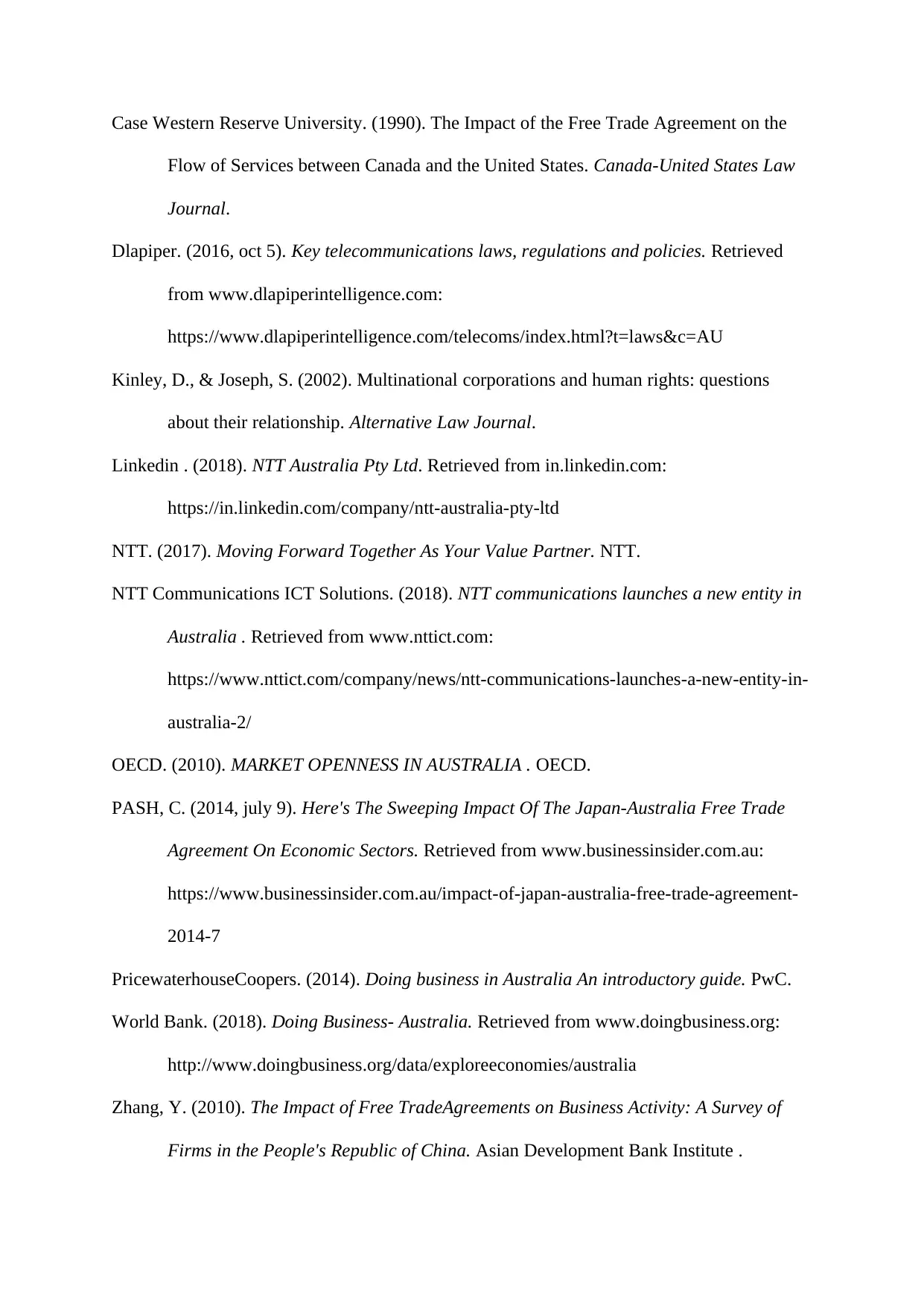
Case Western Reserve University. (1990). The Impact of the Free Trade Agreement on the
Flow of Services between Canada and the United States. Canada-United States Law
Journal.
Dlapiper. (2016, oct 5). Key telecommunications laws, regulations and policies. Retrieved
from www.dlapiperintelligence.com:
https://www.dlapiperintelligence.com/telecoms/index.html?t=laws&c=AU
Kinley, D., & Joseph, S. (2002). Multinational corporations and human rights: questions
about their relationship. Alternative Law Journal.
Linkedin . (2018). NTT Australia Pty Ltd. Retrieved from in.linkedin.com:
https://in.linkedin.com/company/ntt-australia-pty-ltd
NTT. (2017). Moving Forward Together As Your Value Partner. NTT.
NTT Communications ICT Solutions. (2018). NTT communications launches a new entity in
Australia . Retrieved from www.nttict.com:
https://www.nttict.com/company/news/ntt-communications-launches-a-new-entity-in-
australia-2/
OECD. (2010). MARKET OPENNESS IN AUSTRALIA . OECD.
PASH, C. (2014, july 9). Here's The Sweeping Impact Of The Japan-Australia Free Trade
Agreement On Economic Sectors. Retrieved from www.businessinsider.com.au:
https://www.businessinsider.com.au/impact-of-japan-australia-free-trade-agreement-
2014-7
PricewaterhouseCoopers. (2014). Doing business in Australia An introductory guide. PwC.
World Bank. (2018). Doing Business- Australia. Retrieved from www.doingbusiness.org:
http://www.doingbusiness.org/data/exploreeconomies/australia
Zhang, Y. (2010). The Impact of Free TradeAgreements on Business Activity: A Survey of
Firms in the People's Republic of China. Asian Development Bank Institute .
Flow of Services between Canada and the United States. Canada-United States Law
Journal.
Dlapiper. (2016, oct 5). Key telecommunications laws, regulations and policies. Retrieved
from www.dlapiperintelligence.com:
https://www.dlapiperintelligence.com/telecoms/index.html?t=laws&c=AU
Kinley, D., & Joseph, S. (2002). Multinational corporations and human rights: questions
about their relationship. Alternative Law Journal.
Linkedin . (2018). NTT Australia Pty Ltd. Retrieved from in.linkedin.com:
https://in.linkedin.com/company/ntt-australia-pty-ltd
NTT. (2017). Moving Forward Together As Your Value Partner. NTT.
NTT Communications ICT Solutions. (2018). NTT communications launches a new entity in
Australia . Retrieved from www.nttict.com:
https://www.nttict.com/company/news/ntt-communications-launches-a-new-entity-in-
australia-2/
OECD. (2010). MARKET OPENNESS IN AUSTRALIA . OECD.
PASH, C. (2014, july 9). Here's The Sweeping Impact Of The Japan-Australia Free Trade
Agreement On Economic Sectors. Retrieved from www.businessinsider.com.au:
https://www.businessinsider.com.au/impact-of-japan-australia-free-trade-agreement-
2014-7
PricewaterhouseCoopers. (2014). Doing business in Australia An introductory guide. PwC.
World Bank. (2018). Doing Business- Australia. Retrieved from www.doingbusiness.org:
http://www.doingbusiness.org/data/exploreeconomies/australia
Zhang, Y. (2010). The Impact of Free TradeAgreements on Business Activity: A Survey of
Firms in the People's Republic of China. Asian Development Bank Institute .
Paraphrase This Document
Need a fresh take? Get an instant paraphrase of this document with our AI Paraphraser

1 out of 11
Related Documents
Your All-in-One AI-Powered Toolkit for Academic Success.
+13062052269
info@desklib.com
Available 24*7 on WhatsApp / Email
![[object Object]](/_next/static/media/star-bottom.7253800d.svg)
Unlock your academic potential
Copyright © 2020–2026 A2Z Services. All Rights Reserved. Developed and managed by ZUCOL.




